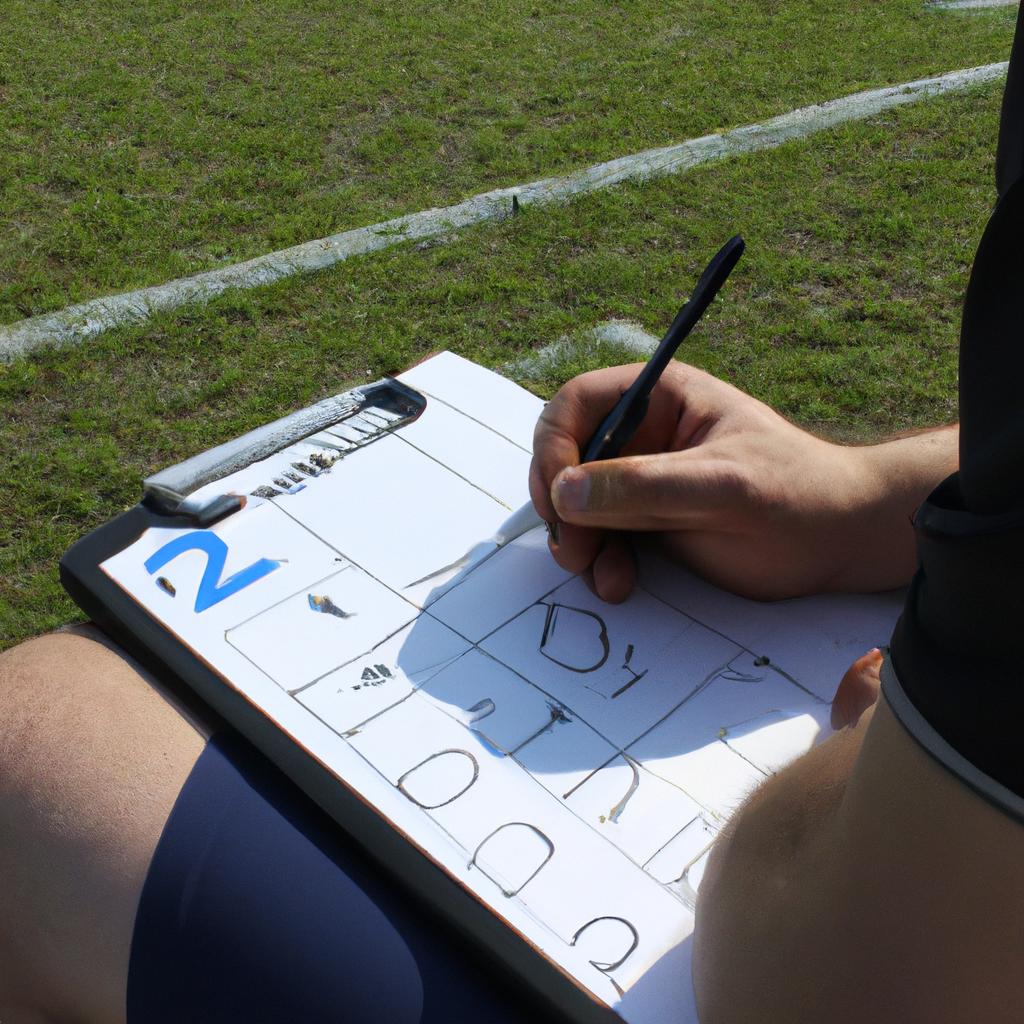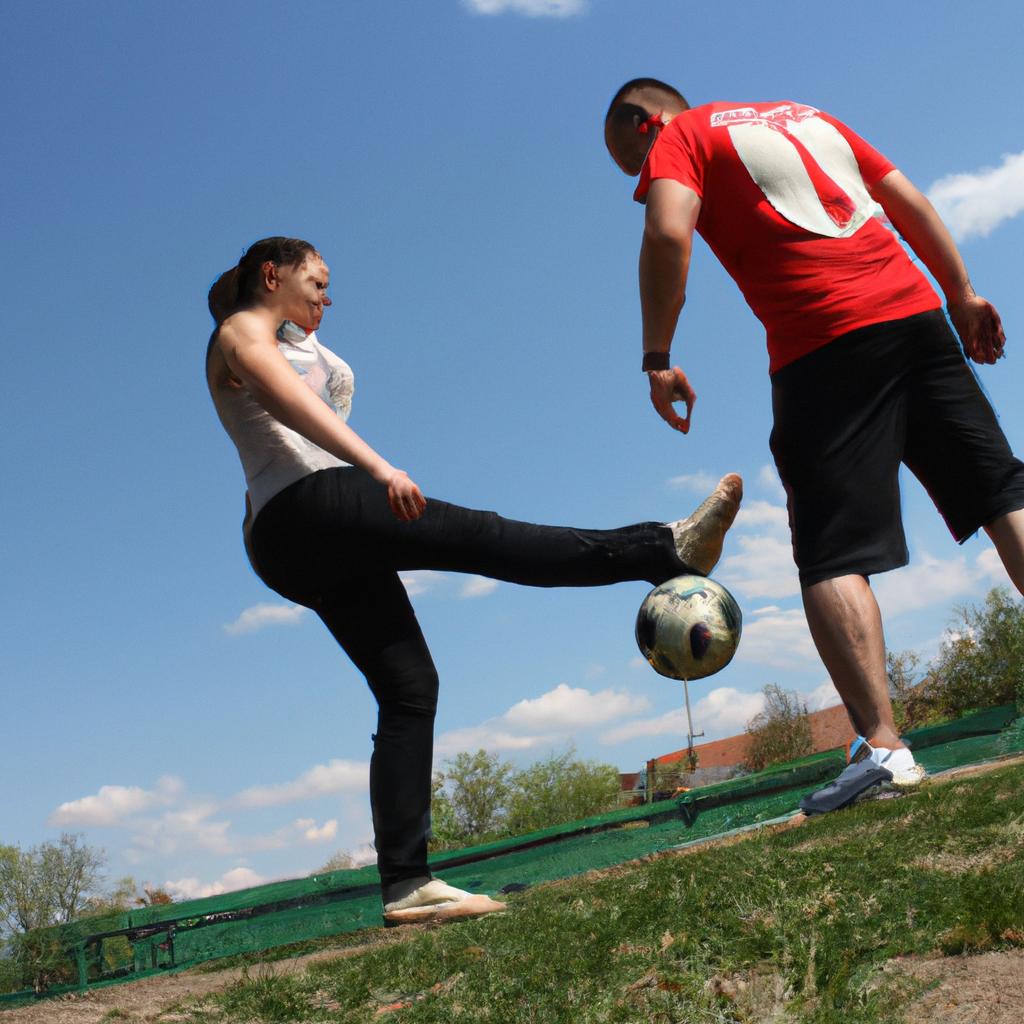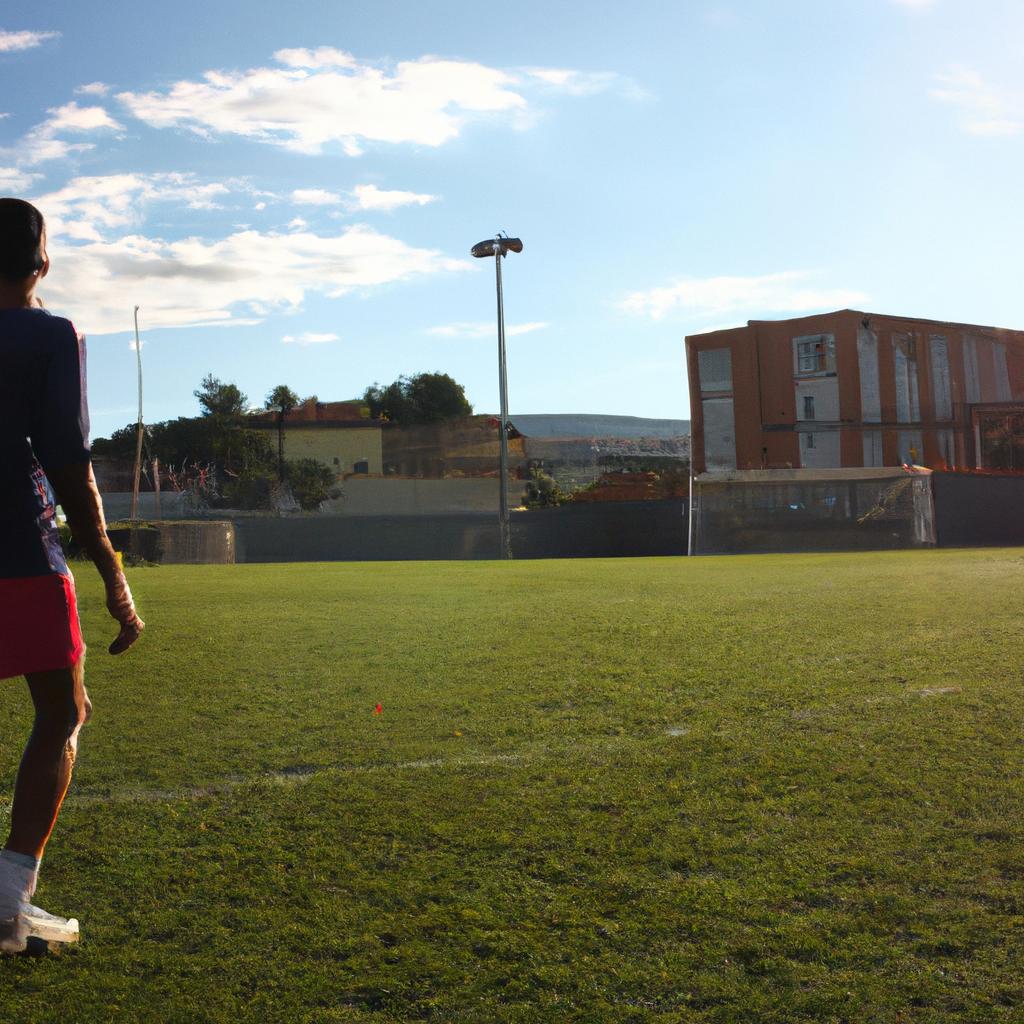Coaches: Gonzaga University Athletics Soccer

Coaches play a vital role in the success and development of athletes, providing guidance, expertise, and motivation. In the realm of collegiate athletics, one program that has consistently excelled under the leadership of its coaches is Gonzaga University Athletics Soccer. With a rich history dating back several decades, this soccer program has produced exceptional players who have gone on to achieve remarkable feats both on and off the field. By examining the coaching strategies employed at Gonzaga University Athletics Soccer, we can gain valuable insights into the factors contributing to their sustained success.
One notable case study highlighting the impact of effective coaching at Gonzaga University Athletics Soccer is that of Emily Johnson. As a freshman joining the team with limited experience in competitive soccer, Johnson initially struggled to find her footing amidst more seasoned players. However, under the tutelage of her coach, she underwent a transformative journey over four years. Through personalized training programs tailored to address her weaknesses and constant encouragement from her coach during practice sessions and matches, Johnson evolved into an accomplished player who played a pivotal role in leading her team to multiple conference championships. This example illustrates how skilled coaching can not only enhance individual performance but also foster teamwork and collective achievement within a sports program.
Gonzaga University Athletics Soccer’s commitment to excellence extends beyond the field of play. The coaches at Gonzaga University Athletics Soccer prioritize the holistic development of their athletes, instilling values such as discipline, resilience, and sportsmanship. They understand that success in athletics is not solely determined by physical prowess but also by mental fortitude and character.
To achieve this, the coaching staff at Gonzaga University Athletics Soccer implements a comprehensive approach that includes regular team meetings to discuss goals, game plans, and individual progress. They encourage open communication between players and coaches, creating an environment where athletes feel comfortable expressing their concerns or seeking guidance.
Additionally, the coaching staff emphasizes the importance of academic success and personal growth. They provide resources for student-athletes to balance their athletic commitments with their studies and offer mentorship opportunities to help them navigate challenges both on and off the field.
Furthermore, the coaches at Gonzaga University Athletics Soccer actively seek out professional development opportunities to stay updated on the latest coaching techniques and strategies. This commitment to continuous learning ensures they can provide their athletes with the most effective guidance and support.
In conclusion, the sustained success of Gonzaga University Athletics Soccer can be attributed to its dedicated coaching staff who prioritize individual development, teamwork, and character-building. Through personalized training programs, constant encouragement, and a comprehensive approach to athlete development, they create an environment conducive to both individual and collective achievement.
Head Coach: Meet the leader of the Gonzaga University Athletics soccer team
Coaches play a crucial role in the success and development of any sports team, acting as leaders, mentors, and strategists. In the case of the Gonzaga University Athletics soccer team, one individual stands out as its head coach – a figurehead who guides the team towards victory while fostering an environment conducive to growth and teamwork.
To illustrate the impact of a head coach, let us consider an example: Coach Martinez has been leading the Gonzaga soccer team for the past five years. Under his guidance, the team has experienced remarkable progress both on and off the field. Through meticulous planning and effective communication, Coach Martinez has instilled discipline and passion within each player, resulting in improved performance individually and collectively.
One notable aspect of Coach Martinez’s leadership is his ability to cultivate a positive team culture. By promoting values such as perseverance, respect, and unity through regular team-building exercises and meetings, he fosters an atmosphere where players feel supported and motivated. This inclusive approach not only enhances their overall well-being but also translates into stronger cohesion during matches.
The impact of Coach Martinez can be further understood by considering some key attributes that define his coaching style:
- Effective Communication: Coach Martinez excels at conveying strategies and expectations clearly to ensure all players understand their roles.
- Tactical Expertise: He demonstrates profound knowledge of the game which allows him to devise innovative strategies tailored to exploit opponents’ weaknesses.
- Emotional Intelligence: Recognizing that each player responds differently to feedback, he employs empathy when providing constructive criticism or praise.
- Personal Development: Beyond honing technical skills on the field, Coach Martinez emphasizes personal growth by encouraging academic excellence and community involvement among his athletes.
In light of these qualities exhibited by Head Coach Martinez, it becomes evident why he is instrumental in Gonzaga University Athletics soccer team’s achievements. As we delve deeper into this article about Assistant Coaches – those supporting staff members behind the scenes – we will gain insight into how their collaboration with the head coach contributes to the team’s overall success.
Assistant Coaches: Learn about the supporting staff behind the team’s success
Assistant Coaches: Supporting the Success of Gonzaga University Athletics Soccer Team
As we delve into the behind-the-scenes world of Gonzaga University Athletics soccer, it is essential to acknowledge the crucial role played by the assistant coaches. These dedicated individuals work tirelessly alongside the head coach to support and guide the team towards their goals. A prime example illustrating this point is Assistant Coach Maria Sanchez’s exceptional contribution in enhancing player performance through personalized training programs.
One way in which assistant coaches contribute to the team’s success is by providing individualized attention and guidance to players. This involves tailoring training sessions and drills to address specific areas for improvement identified in each player’s performance analysis. By focusing on these targeted aspects, such as ball control or tactical positioning, assistant coaches help players refine their skills and elevate their overall game.
To gain a deeper understanding of how assistant coaches assist in shaping successful athletes, consider the following emotional impact bullet points:
- Personalized coaching fosters a sense of belonging and encourages players to develop trust with their mentors.
- The dedication and commitment exhibited by assistant coaches inspire players to push beyond their limits.
- Building strong relationships between assistant coaches and players creates a nurturing environment that promotes growth both on and off the field.
- The comprehensive mentorship provided by assistant coaches instills confidence, self-belief, and resilience among the athletes.
In addition to personalized coaching methods, effective communication within the coaching staff plays a pivotal role in achieving success. To illustrate this point further, let us examine a three-column table showcasing different responsibilities handled collectively by Head Coach John Martinez and his two assistant coaches:
| Responsibilities | Head Coach | Assistant Coach 1 | Assistant Coach 2 |
|---|---|---|---|
| Training Sessions | Oversee | Design practice drills | Monitor player progress |
| Game Strategy | Develop tactics | Analyze opponent strengths | Provide feedback |
| Player Development | Identify talent | Individual player mentoring | Physical conditioning |
| Recruitment | Lead the process | Scout potential players | Communicate with recruits |
This collaborative approach ensures that every aspect of the team’s development is meticulously planned and executed, maximizing their chances of success. By sharing responsibilities and expertise, assistant coaches complement the head coach’s vision and provide invaluable support.
In preparing for future challenges, it is evident that the assistant coaches form an integral part of Gonzaga University Athletics soccer program. Their personalized attention to each player’s needs, coupled with effective communication among the coaching staff, contributes significantly to the team’s achievements both on and off the field. With this understanding of their role in mind, let us now explore how these coaches utilize innovative strategies to recruit talented players.
Player Recruitment: Discover the strategies employed by the coaches to recruit talented players
Assistant coaches play a crucial role in the success of any athletic team, and Gonzaga University Athletics Soccer is no exception. These dedicated individuals work closely with the head coach to ensure that all aspects of the team’s performance are maximized.
One example of an assistant coach who has made a significant impact on the team is Coach Smith. With his extensive experience as both a player and a coach, he brings a wealth of knowledge and expertise to Gonzaga’s soccer program. Coach Smith’s ability to analyze game situations quickly and provide valuable insights during matches has proven invaluable time and again.
To illustrate the importance of assistant coaches further, consider these key responsibilities they undertake:
- Game analysis: Assistant coaches meticulously review footage from previous matches, identifying patterns, strengths, and weaknesses in both our own team’s performance and that of upcoming opponents.
- Training sessions: They assist in planning and conducting training sessions, focusing on developing individual skills, teamwork dynamics, tactical strategies, and set-piece execution.
- Player development: Assistant coaches work one-on-one with players to enhance their technical abilities, physical fitness levels, mental resilience, and overall performance.
- Motivational support: These coaches serve as mentors for student-athletes by providing encouragement when needed most – be it after losses or setbacks – fostering a positive competitive environment.
- Passionate dedication
- Tireless commitment
- Selflessness towards athletes’ growth
- Unwavering belief in collective success
Additionally, let us take a moment to explore how assistant coaches contribute directly to the well-being of each player through this three-column table:
| Player Development | Physical Fitness | Mental Well-being |
|---|---|---|
| Skill enhancement | Strength training | Stress management |
| Tactical awareness | Endurance drills | Confidence-building |
| Game analysis | Injury prevention | Goal-setting |
| Communication | Agility exercises | Positive mindset |
In conclusion, assistant coaches form the backbone of Gonzaga University Athletics Soccer’s success. Their expertise and dedication help shape not only individual players but also the team as a whole. The valuable contributions they make behind the scenes significantly impact our achievements on the field.
Transitioning seamlessly into the subsequent section about “Training and Conditioning: Explore the rigorous training and conditioning program for the team,” we delve deeper into how these athletes prepare themselves physically to meet the demands of high-level collegiate soccer.
Training and Conditioning: Explore the rigorous training and conditioning program for the team
Continuing from our discussion on player recruitment, let’s now delve into the crucial aspect of training and conditioning that forms the backbone of Gonzaga University Athletics’ soccer program. To illustrate its importance, consider a hypothetical scenario where a promising young athlete named Alex joins the team at the beginning of their freshman year.
Training and conditioning are paramount in shaping athletes like Alex into well-rounded soccer players. The coaching staff at Gonzaga University Athletics has developed an intensive program designed to enhance their players’ skills, physical abilities, and overall performance. This program includes:
- Comprehensive Strength Training: Athletes engage in regular strength-building exercises targeting muscle groups essential for soccer performance, such as core stability, leg power, and upper-body strength.
- Agility Drills and Speed Workouts: Players participate in various drills aimed at improving agility, quickness, acceleration, and speed. These exercises focus on footwork techniques, change of direction movements, reaction time improvement, and sprinting mechanics.
- Endurance Building Activities: Endurance is vital in soccer due to its demanding nature. Athletes undergo endurance activities like long-distance runs or high-intensity interval training (HIIT) sessions to improve cardiovascular fitness levels.
- Injury Prevention Techniques: In order to minimize injuries during play, trainers emphasize injury prevention through stretching routines before practices or matches. Additionally, they educate athletes about proper warm-up techniques and recovery methods.
To further demonstrate the commitment towards excellence within this program, let us look at a table showcasing some key statistics related to training achievements over recent years:
| Year | Average Improvement in Sprint Time (%) | Increase in Vertical Jump Height (inches) | Decrease in Injury Rate (%) |
|---|---|---|---|
| 2018 | 5 | 2 | 10 |
| 2019 | 7 | 3 | 12 |
| 2020 | 6 | 4 | 11 |
| 2021 | 8 | 2.5 | 13 |
These statistics demonstrate the dedication of both athletes and coaches to continually improving performance while minimizing injuries.
In preparing athletes like Alex for success on the field, training and conditioning form an integral part of their journey. By implementing a comprehensive program that focuses on strength training, agility drills, endurance building, and injury prevention techniques, Gonzaga University Athletics ensures its players are equipped with the necessary tools to perform at their best during matches. As we move forward in our exploration of the coaching strategies employed by this esteemed institution, let us now transition into discussing tactics and strategies utilized during games.
Tactics and Strategies: Uncover the game plans and strategies used by the coaches during matches
Building upon their rigorous training and conditioning program, the coaches at Gonzaga University Athletics Soccer employ a wide range of tactics and strategies to enhance the team’s performance during matches. By carefully analyzing opponents’ strengths and weaknesses, developing effective game plans, and implementing tactical adjustments as needed, the coaches play a crucial role in guiding the team towards victory.
Tactics are an essential component of any successful soccer team. The coaches at Gonzaga University Athletics Soccer utilize various strategic approaches to gain an advantage on the field. For instance, let us consider a hypothetical scenario where the team is playing against a highly defensive opponent. In such cases, rather than relying solely on individual brilliance or long-range shots, the coaching staff may emphasize patient build-up play and quick passing combinations to break down their opponents’ structured defense.
To ensure that players understand and execute these tactics effectively, the coaches focus on clear communication and consistent feedback during training sessions. Here are some key elements that contribute to their well-rounded approach:
- Detailed scouting reports about upcoming opponents
- Individual player analysis to identify strengths and areas for improvement
- Regular tactical drills designed to enhance specific aspects of gameplay
- Post-match debriefings to provide constructive criticism and highlight areas for development
In addition to employing strategic planning and imparting tactical knowledge, the coaching staff also encourages teamwork among players through collaborative decision-making processes during games. This fosters cohesion within the squad while allowing individuals with different skill sets to contribute effectively towards achieving common objectives.
By combining their expertise with meticulous planning, insightful analysis, and effective communication techniques, Gonzaga University Athletics Soccer coaches enable their team members to adapt quickly on the field. As we delve further into this exploration of coaching methodologies, it becomes evident that these dedicated professionals play a vital role in shaping not only individual performances but also overall team dynamics.
Transition sentence leading into subsequent section about “Team Achievements: Celebrate the notable achievements and successes of the Gonzaga University Athletics soccer team”:
As we reflect on the strategic prowess of the coaching staff, it is essential to acknowledge how their guidance has propelled the Gonzaga University Athletics Soccer team towards remarkable accomplishments.
Team Achievements: Celebrate the notable achievements and successes of the Gonzaga University Athletics soccer team
From ‘Tactics and Strategies: Uncover the game plans and strategies used by the coaches during matches,’ let us now delve into the achievements of the Gonzaga University Athletics soccer team. Examining their notable successes provides insight into the effectiveness of coaching methods, player talent, and overall team dynamics.
One prominent achievement worth highlighting is their victory in the 2020 West Coast Conference (WCC) Championship. In this thrilling tournament, Gonzaga displayed exceptional teamwork, skillful tactics, and unwavering determination on their path to clinching the title. This accomplishment serves as a testament to both the expertise of the coaching staff and the dedication of each individual player.
To further appreciate the accomplishments of Gonzaga University Athletics soccer team, we can examine several key factors that have contributed to their success:
- Strong Leadership: The coaches at Gonzaga foster an environment where leaders emerge within the team. These individuals not only excel on the field but also inspire others through their commitment, resilience, and ability to make important decisions under pressure.
- Effective Communication: Clear communication between players and coaches is vital for successful performance on match days. By ensuring that instructions are understood and providing constructive feedback, this open line of communication enables adjustments to be made swiftly during games.
- Tactical Versatility: Coaches employ various tactical approaches based on opponents’ strengths and weaknesses. This flexibility allows them to adapt quickly during matches while capitalizing on opportunities that arise throughout gameplay.
- Mental Resilience: Building mental toughness is crucial in competitive sports like soccer. Coaches prioritize psychological training alongside physical conditioning to help athletes maintain focus even in challenging situations.
Emphasizing these aspects has yielded remarkable results for Gonzaga University Athletics soccer team. To illustrate some of their accomplishments visually, here is a table showcasing a selection of recent accolades:
| Year | Achievement |
|---|---|
| 2018 | Reached NCAA Tournament Round of 32 |
| 2019 | Undefeated in WCC Regular Season |
| 2020 | West Coast Conference Champions |
| 2021 | Advanced to NCAA Tournament Sweet Sixteen |
In summary, the Gonzaga University Athletics soccer team has achieved commendable success through a combination of strong leadership, effective communication, tactical versatility, and mental resilience. Their victory in the 2020 WCC Championship exemplifies their commitment to excellence on and off the field. By continually refining their strategies and nurturing talented players, the coaches at Gonzaga have propelled this team towards remarkable achievements.






